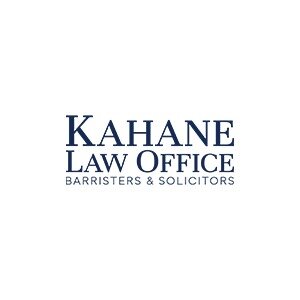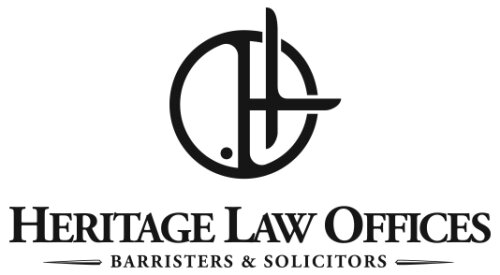Best Energy, Environment & ESG Lawyers in Edmonton
Share your needs with us, get contacted by law firms.
Free. Takes 2 min.
List of the best lawyers in Edmonton, Canada
About Energy, Environment & ESG Law in Edmonton, Canada
Edmonton, as the capital city of Alberta, is at the heart of Canada's energy industry and is uniquely positioned when it comes to laws governing energy, environment, and environmental, social, and governance (ESG) matters. The region is known for its significant oil, gas, and renewable energy resources, making regulatory compliance and sustainable practices essential concerns for businesses, landowners, and residents. Legal matters in this field often involve a mix of federal, provincial, and municipal laws, reflecting the importance of responsible energy development, environmental protection, and adherence to evolving ESG standards.
Why You May Need a Lawyer
There are many reasons why individuals and organizations in Edmonton might need a lawyer specializing in energy, environment, or ESG law. Common situations include:
- Navigating complex regulations around resource development or environmental protection
- Seeking permits or approvals for energy projects, including renewable developments
- Responding to environmental enforcement actions or regulatory investigations
- Ensuring corporate compliance with ESG reporting requirements
- Negotiating land use agreements, such as leases for oil, gas, or wind energy
- Resolving disputes involving contamination, land remediation, or water rights
- Addressing Indigenous consultation and accommodation obligations
- Pursuing or defending environmental assessments and appeals
- Participating in municipal planning or zoning related to green initiatives
Legal advice helps clients understand their responsibilities, avoid penalties, and operate sustainably and ethically within the law.
Local Laws Overview
Energy, environment, and ESG laws in Edmonton are governed by a combination of federal and provincial statutes, along with relevant municipal bylaws:
- Federal level: The Impact Assessment Act and the Canadian Environmental Protection Act set standards for major project approvals and pollution control. The Canadian Energy Regulator Act may apply to certain pipelines and energy infrastructure.
- Provincial level: The Alberta Environmental Protection and Enhancement Act, the Water Act, and the Responsible Energy Development Act are cornerstone pieces of legislation. The Alberta Energy Regulator is responsible for overseeing energy and environmental matters in the province.
- Municipal level: Edmonton has bylaws and initiatives promoting environmental stewardship, waste management, and climate resilience. The City participates in the Edmonton Declaration on climate leadership.
- ESG considerations: Growing attention is placed on sustainability, human rights, anti-corruption, emissions disclosure, and diversity under evolving ESG frameworks. Canadian securities law requires some public reporting in these areas, and industry best practices are rapidly changing.
Understanding how these legal layers interact is crucial for anyone operating in this sector.
Frequently Asked Questions
What is ESG and why is it important in Edmonton?
ESG stands for Environmental, Social, and Governance criteria. It measures how businesses perform as stewards of nature, how they manage relationships with employees, suppliers, customers, and how they govern themselves. In Edmonton, ESG has become important due to investor expectations, public pressure, and regulatory changes aimed at sustainability and long-term risk management.
Who regulates energy development in Edmonton and Alberta?
The Alberta Energy Regulator (AER) is the primary body overseeing energy resource activities such as oil, gas, and coal in the province. For federally regulated pipelines and international projects, the Canada Energy Regulator may also be involved.
What environmental permits are commonly required for business operations?
Common permits include approvals for emissions, waste disposal, water use, land disturbance, and sometimes wildlife impact. Municipal permits may be needed for construction or redevelopment with environmental impacts.
How do Indigenous consultation requirements affect projects?
Alberta law and federal law require meaningful consultation and, in some cases, accommodation with Indigenous communities before proceeding with certain projects. Failing to fulfill these duties can delay or halt projects.
What should I do if I am facing an environmental investigation or enforcement action?
Seek legal advice right away. It is advisable to understand your rights and obligations, cooperate where appropriate, and respond promptly while preserving all relevant documents.
Are there incentives for renewable energy in Edmonton?
Yes, there are both provincial and municipal incentives and programs that encourage the adoption of renewable energy technology, such as solar or wind power, on both the residential and commercial levels.
How can businesses ensure they are compliant with ESG standards?
Businesses should review applicable legal requirements, monitor ESG best practices, implement internal compliance programs, and consider third-party audits or certifications relevant to their industry.
Can neighbours object to energy or infrastructure projects?
Yes, affected landowners and the public often have the right to participate in regulatory hearings or submit statements during public consultations about proposed projects with environmental impacts.
What are the consequences of environmental non-compliance?
Penalties can include significant fines, project shutdowns, cleanup orders, and even criminal charges in serious cases or repeated violations. There can also be reputational and financial damage.
How are climate change concerns addressed in local laws?
Alberta and Edmonton have enacted laws and policies to limit greenhouse gas emissions, improve resilience, and promote sustainable development. These include climate plans, reporting requirements, and support for low-carbon technology.
Additional Resources
If you are seeking more information or support, consider contacting or reviewing information from the following organizations and agencies:
- Alberta Energy Regulator (AER)
- Alberta Environment and Protected Areas
- Canada Energy Regulator (CER)
- City of Edmonton - Environment and Climate Resilience Department
- Environmental Law Centre (Alberta)
- Alberta Utilities Commission (AUC)
- Alberta Energy
- Local Indigenous consultation offices
- Legal clinics, such as the Edmonton Community Legal Centre
- Environmental NGOs like the Pembina Institute or Ecojustice
Next Steps
If you think you need legal help with an energy, environment, or ESG matter in Edmonton, these are the recommended next steps:
- Gather any documents and background information related to your concern, such as permits, correspondence, or notices
- Identify the specific area or issue you need help with
- Seek a lawyer or law firm experienced in energy, environmental, or ESG law in Edmonton
- Book a consultation to discuss your situation, options, and legal strategy
- Stay updated on any changes in regulations or industry practices that may affect you
- Consider connecting with relevant regulatory agencies or support organizations for guidance
Qualified legal advice can save you time, reduce risks, and ensure you comply with the law while advancing your goals in Edmonton’s dynamic energy and environmental landscape.
Lawzana helps you find the best lawyers and law firms in Edmonton through a curated and pre-screened list of qualified legal professionals. Our platform offers rankings and detailed profiles of attorneys and law firms, allowing you to compare based on practice areas, including Energy, Environment & ESG, experience, and client feedback.
Each profile includes a description of the firm's areas of practice, client reviews, team members and partners, year of establishment, spoken languages, office locations, contact information, social media presence, and any published articles or resources. Most firms on our platform speak English and are experienced in both local and international legal matters.
Get a quote from top-rated law firms in Edmonton, Canada — quickly, securely, and without unnecessary hassle.
Disclaimer:
The information provided on this page is for general informational purposes only and does not constitute legal advice. While we strive to ensure the accuracy and relevance of the content, legal information may change over time, and interpretations of the law can vary. You should always consult with a qualified legal professional for advice specific to your situation.
We disclaim all liability for actions taken or not taken based on the content of this page. If you believe any information is incorrect or outdated, please contact us, and we will review and update it where appropriate.
Browse energy, environment & esg law firms by service in Edmonton, Canada
Edmonton, Canada Attorneys in related practice areas.











